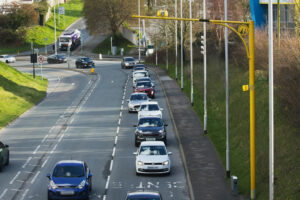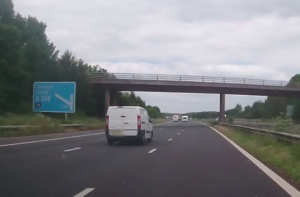The Scottish Government is set to go out to consultation on what is considered to be one of its most ambitious Road Safety Frameworks ever, targeting zero fatalities and injuries on Scotland’s roads by 20250.
The Road Safety Framework to 2030 sets out a ‘compelling long-term vision’ for road safety, Vision Zero. The journey to achieving this vision will also include ambitious interim targets where the number of people being killed or seriously injured on our roads will be halved by 2030, according to Transport Scotland. This will include a fund to help local authorities meet the targets.
Views are now being sought to inform proposals for achieving the targets which will be crucial to Scotland having the best road safety performance in the world.
“Our vision is for Scotland to have the best road safety performance in the world by 2030. It is unacceptable that anyone is killed or seriously injured on our roads and this Framework identifies the part everyone of us has to play in ensuring our long-term aspiration for that Vision Zero to
become a reality,” said the Vision for Scotland framework document.
“The explicit, longer-term goal of the Safe System is for a road traffic system which becomes free from death and serious injury through incremental, targeted improvements within a specified safety performance
framework,” it added.
The framework’s Safe System is central to achieving the success moving forward. This is split into five main sections; Safe road use, safe vehicles, safe speeds, safe roads and roadsides and post crash response.
Under the safe systems, approach other indicators have been developed either intermediate measures such tracking performance of casualty figures for specific user groups, or key performance indicators that focus on measuring observed road safety behaviours, vehicle safety and road infrastructure.
According to Transport Scotland, the framework’s strategic actions for delivery include;
*Speed: we will deliver a range of speed management initiatives
to support the Safe System
*Climate: we will deliver road safety initiatives that positively impact the climate emergency and we will mitigate the negative impacts climate
change may have on road safety
*Funding & Resourcing: we will consider how funding streams can be improved for national road safety delivery
*Change in Attitudes & Behaviour: we will engage in partnership working to enable all road users to understand their road safety responsibilities, allowing them to improve their attitudes and behaviours for the safety of
themselves and others
*Active & Sustainable Travel: we will ensure road safety remains a key focus of active & sustainable travel in Scotland
*Knowledge & Data Analysis: we will ensure our actions are evidence-led to support the delivery of the Safe System
*Technology: we will research, implement and evaluate technologies for use within the Safe System and promote them as appropriate
*Enforcement: we will optimise enforcement to encourage good road user behaviour to support the Safe System
*Education: we will provide opportunities to all road users to gain the knowledge, skills and experience required to become safe and responsible
users
*Health: we will strengthen the relationship between health
and road safety, reduce the likelihood, number and severity
of collisions and improve the post-crash response.
Cabinet Secretary for Transport, Infrastructure and Connectivity Michael Matheson launched the consultation whilst also announcing a £675,000 funding allocation to support 24 newly identified safety camera sites. This work will improve road safety by encouraging improved driver behaviour and speed limit compliance at key areas.
Mr Matheson said: “Our Road Safety Framework to 2020 has supported a reduction in the numbers of people killed or seriously injured in Scotland’s roads. It’s remarkable that even with a 27% rise in traffic since 1995, we’ve seen a 61% decrease in road collisions across the same period.
“Even though we are on track to meet the 2020 target for reductions in the number of people killed on our roads – this brings no consolation to the family and friends who have been left completely devastated by the death of loved ones on our roads. We must do more – and the positive improvements we’ve made, stem from a collective belief by all road safety partners in Scotland, that road deaths are not an inevitability. We believe that they are preventable. Our ambition for Vision Zero by 2050, is achievable, and I believe can be made a reality, by fully embedding the Safe System approach to road safety.
“Our framework will put people at its centre, and will provide a more forgiving road system that takes human vulnerability and fallibility into account. It intends to recognise that people are fragile and make mistakes that can lead to collisions but it should result in no death or serious injury. It also focuses on supporting our National Transport Strategy and net-zero aspirations in allowing people to make informed choices to travelling in a safe, active and sustainable way. We all have a collective responsibility to look out for each other on our roads – so have your say through our consultation and let’s deliver a framework that will save lives across the next decade.”
“The development of the next framework does not mean we pause from taking decisive action to improve road safety. An exercise has been completed to identify new sites that would benefit from safety camera enforcement. Our investment of £675,000 will improve speed limit compliance, encourage better driver behaviour and reduce the numbers of people killed or seriously injured across the road network.”
Assistant Chief Constable Mark Williams at Police Scotland said: “Every death on our roads is a tragedy and Police Scotland is committed to working closely with our road safety partners to reduce the number of people killed or seriously injured. We regularly conduct road safety operations to improve driver behaviour, educate motorists and other road users, as well as carrying out enforcement activity where required.
“We really welcome the public consultation on the Road Safety Framework and would urge all road users to contribute in order to help shape how we deliver safer roads in the years to come.”
Keith Irving, Chief Executive of Cycling Scotland said: “Major progress has been made reducing road casualties over the past decade. Key initiatives such as the average speed cameras on the A9, which were introduced despite opposition, have resulted in fewer casualties in vehicles. It’s clear that more action is needed, especially to tackle the rise in serious injuries among people cycling. More dedicated bike lanes, separated from traffic is the top priority to improve cycling safety.
“Operation Close Pass has been a recent and welcome step to improve safe driving around people cycling. More enforcement of road laws is essential to improve safety for vulnerable road users in particular, and achieve Vision Zero.
“Improving the evidence about cycling casualties, including the reporting of serious injuries, is also key to prevention. The new Road Safety Framework to 2030 is a welcome opportunity to ensure a robust, evidence-based approach to cut casualties on our roads.”
Details included in the consultation can be found at: https://consult.gov.scot/transport-scotland/road-safety-framework-to-2030/
























